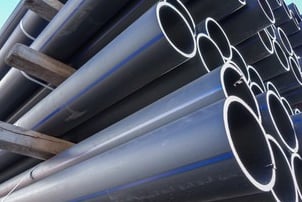OVER 45+ YEARS OF MAKING THE FINEST QUALITY HDPE PIPE & PLB PIPES
The Significance of HDPE Pipes in the 21st Century
Read Below to Know More.
2 min read
1. Durability and Longevity
One of the key reasons why HDPE pipes are highly valued is their exceptional durability and longevity. Unlike traditional materials like metal or concrete, HDPE pipes are resistant to corrosion, chemical reactions, and wear and tear. This makes them ideal for underground applications, where they can withstand harsh environments and last for decades.
2. Flexibility
HDPE pipes are highly flexible, allowing for easy installation even in challenging terrains. Their flexibility enables them to adapt to ground movements, reducing the risk of leaks or pipe failures. Additionally, their lightweight nature makes transportation and handling more convenient, resulting in cost savings during installation.
3. Leak-Free Joints
The fusion-welded joints of HDPE pipes provide a seamless and leak-free connection. Unlike traditional piping systems that require various fittings and connectors, HDPE pipes can be fused together, eliminating potential weak points. This ensures a reliable and continuous flow of fluids or gases, minimizing the risk of leakage and subsequent damage.
4. Environmentally Friendly
As sustainability becomes increasingly important, HDPE pipes offer an eco-friendly solution. They are made from recyclable materials and can be manufactured using recycled HDPE, reducing the demand for new raw materials. Furthermore, their long lifespan and resistance to chemicals and UV radiation contribute to a reduced carbon footprint and less overall environmental impact.
5. Versatility
HDPE pipes are highly versatile and can be used in a wide range of applications. They are commonly used in water supply systems, irrigation networks, sewage systems, and gas pipelines. Their ability to handle both high and low temperatures, as well as different pressures, makes them suitable for various industries, including agriculture, construction, and mining.
6. Cost-Effective
HDPE pipes offer significant cost advantages over other materials. Their long lifespan and low maintenance requirements result in reduced replacement and repair costs. Moreover, their resistance to chemicals and corrosion eliminates the need for protective coatings, saving both time and money. Additionally, their lightweight nature reduces transportation costs and makes installation more efficient.
In conclusion, HDPE pipes have become indispensable in the 21st century due to their durability, flexibility, leak-free joints, environmental friendliness, versatility, and cost-effectiveness. As industries continue to evolve, these pipes will continue to play a crucial role in the development of modern infrastructure.


In the 21st century, the importance of HDPE (High-Density Polyethylene) pipes cannot be overstated.
These versatile and durable pipes have revolutionized various industries and become vital to modern infrastructure.
HDPE pipes have proven to be an excellent choice for water supply systems to gas pipelines due to their numerous advantages.
Let us learn about 6 key benefits of HDPE pipes
ARPAN POLYPLAST PVT. LTD.
MANUFACTURERS OF HDPE & PLB PIPES, FITTINGS.


